Table of Contents
You always see horses galloping and jumping over vast fields and muddy grounds. However, have you ever wondered can horses swim? Yes, horses are really powerful creatures, and they love being in the water. Not only this, but they also have the instinct to swim. They are born like this as they are the most sturdy and strong four-legged species on this planet. Now, you must be thinking about the science behind horse swimming. Well, no need to look anywhere else for that. We are here to guide you through all the dos and don’ts of a horse’s experience in the water. Hence, let us dive into these underwater swim adventures with our powerful horses.
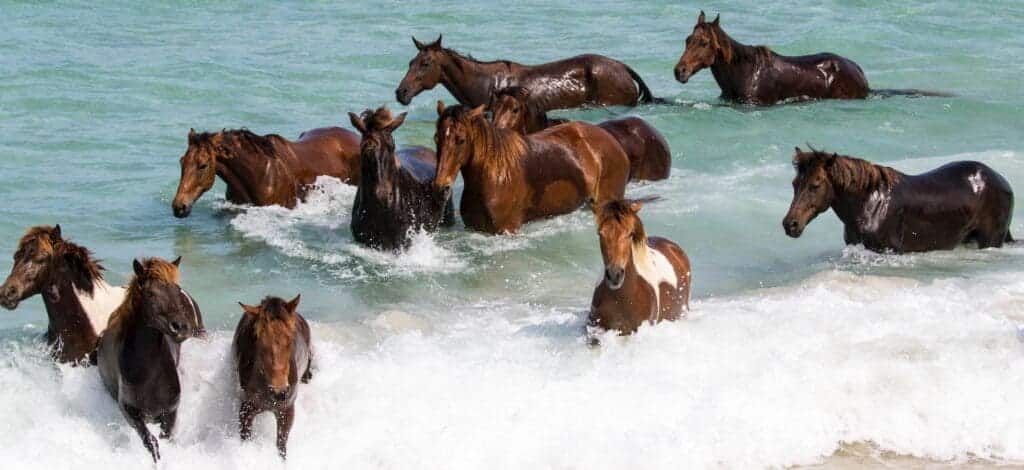
Can Horses Swim?
Can horses swim? Horses have the innate ability to swim well in deep water. Whether it’s your Brabant horse or any other breed, they swim with a stroke similar to their terrestrial trot, and their huge lungs aid in their buoyancy. Since horses cannot swim underwater, they must maintain their heads above water to breathe. Although horses don’t swim daily, equestrian specialists like Liz Newman of Horse Homes point out that they pick up the skill quickly and can move in the water to prevent drowning. This ability serves as a survival mechanism, demonstrating the innate ability to swim in horses. Horses may also swim while carrying a rider; care and appropriate training are necessary to ensure everyone’s safety, the horse and the rosary
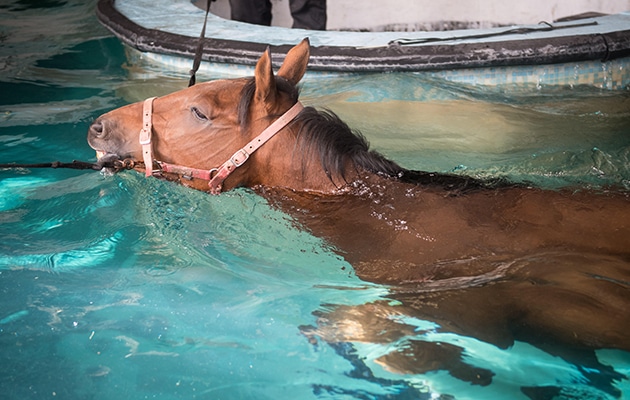
· How do Horses Swim?
Horses swim by continuing forward motion, which naturally keeps their bodies afloat. They instinctively hold their heads above the water to keep their mouths and noses open for breathing. Horses move most efficiently in the water using their legs to create a paddle-like motion. This exercise is physically taxing because of the water resistance, frequently raising the participant’s heart rate and causing them to breathe heavily. It’s essential to let horses move freely and spontaneously when they swim. Getting in the way of their motion can make it more difficult for them to swim correctly and safely. In the water, always make sure they can trust their instincts.
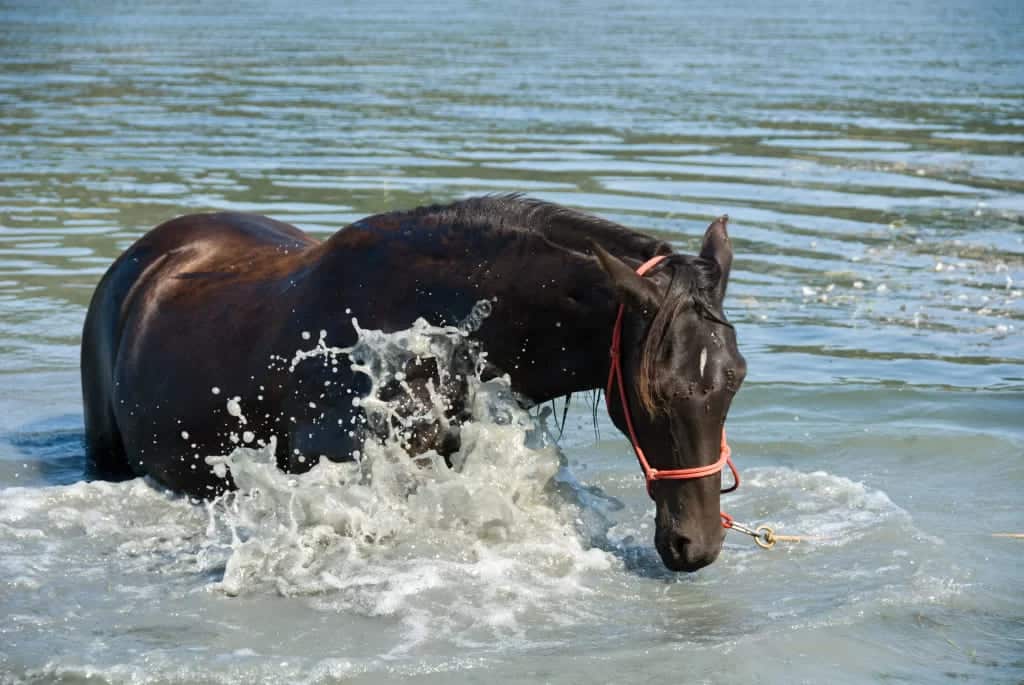
A Horse’s Obsession with Swimming
Water’s Allure
Horses are naturally curious about the water. They paw through it and even blow bubbles to investigate its depth and movement. This lively nature may indicate a preference for aquatic sports like swimming.
Pleasure vs Hesitancy
Not every horse chooses to swim. They are reluctant to go into the water because of their vision issues, which include poor depth perception.
Horses with bad experiences may also link the water with dread, which makes them reluctant to swim.
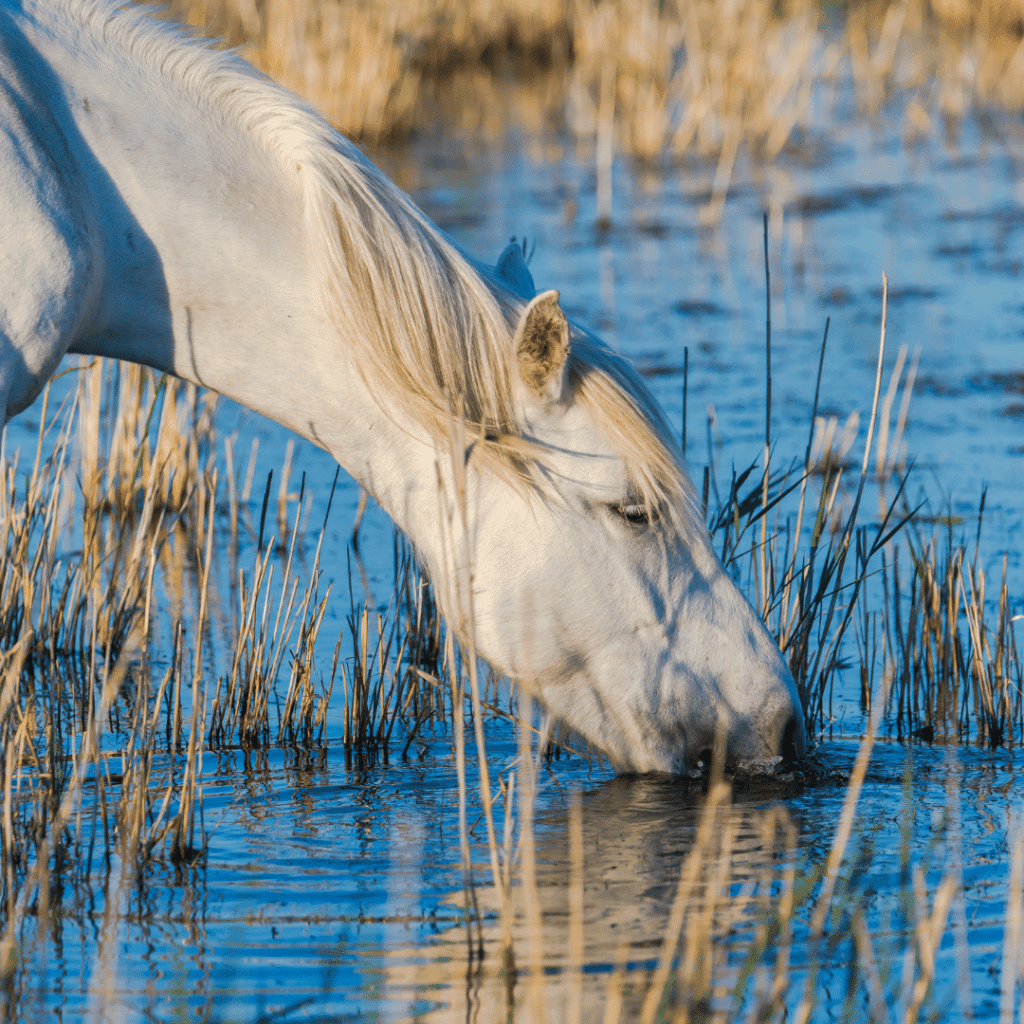
Individual Preference
Like other animals, some horses want to stay dry. Their aversion to getting wet determines how ready they are to interact with water.
Many horses love swimming despite these difficulties because they appreciate its buoyancy and freedom. This is a fun way to beat the summer heat in addition to being physical activity. Every horse’s approach to water, whether out of play or hesitation, indicates its personality and tastes.
Horse Swimming: The Pros
For horses, swimming is a healthy and natural exercise that has been shown to affect fitness, health, and recovery from injury positively. Pennsylvania Horse Racing Association also approves of this aerobic exercise for horses.

· ·Improved Muscle Strength
Improved muscle strength results from swimming’s ability to use a variety of muscle groups, which increases total muscle mass and strength.
· ·Increased stamina and endurance
Swimming’s resistance makes it a vigorous cardiovascular exercise that improves heart and lungs capacity.
· ·Healing and Recuperation
Low impact
Swimming puts less strain on joints than land activities, which makes it perfect for recovering from tendon and leg ailments.
Healing more quickly
The buoyancy of water relieves pressure on wounds, allowing for a quicker healing process without sacrificing muscular contraction.
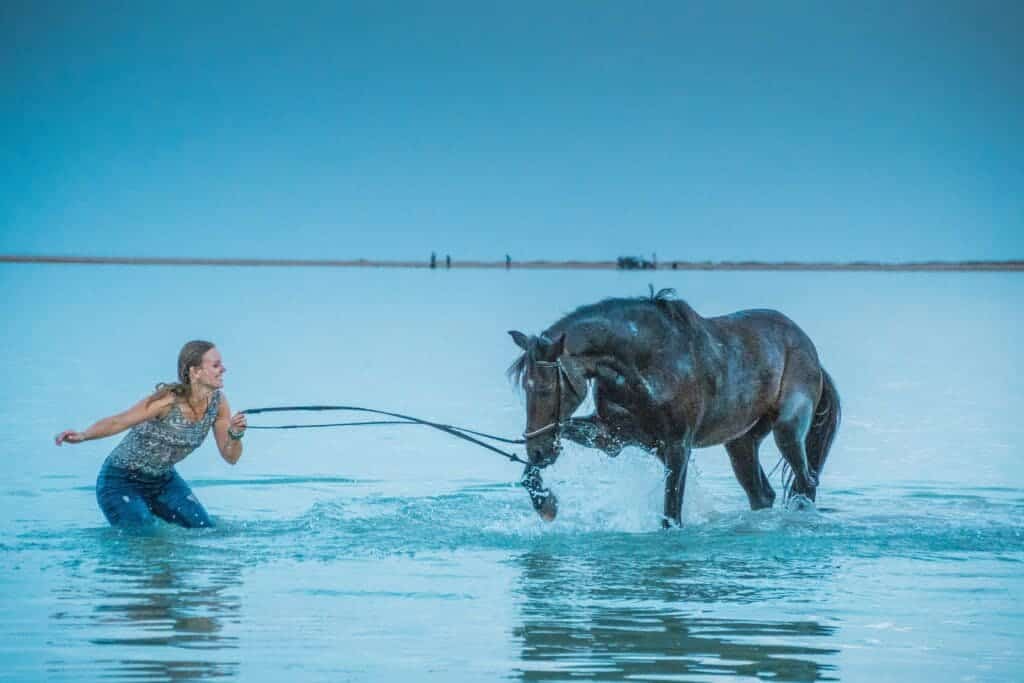
· Flexibility and Pleasure
Instinct
Swimming is a good and fun exercise for horses because of their innate aptitude.
Diverse training
Keeping the horse physically and mentally challenged while swimming can be a fun change from standard ground exercises.
These advantages highlight why equestrian professionals routinely include swimming into training and horse recovery plans, utilizing horses’ innate skills and tendencies to optimize their well-being and efficiency.

Can Horses Swim with a Rider?
Horses can swim with a rider, but it takes caution to protect the animal’s comfort and safety. Horses are naturally good swimmers. Still, they require flexibility to move around in the water. To ensure that the horse can move its head freely, which is essential for balance and steering in the water, riders should keep their grasp on the reins relaxed. Taking off the saddle is also an excellent way to avoid limiting the horse’s mobility. The rider’s primary responsibility when riding a horse in the water is to be a composed, directing presence while allowing the horse to follow its instincts and swim naturally. The rider must maintain composure and faith in the horse’s swimming ability. Sensing the horse’s forceful movements through the water can be exciting, but maintaining rider awareness is essential to ensuring everyone has a safe and happy journey.
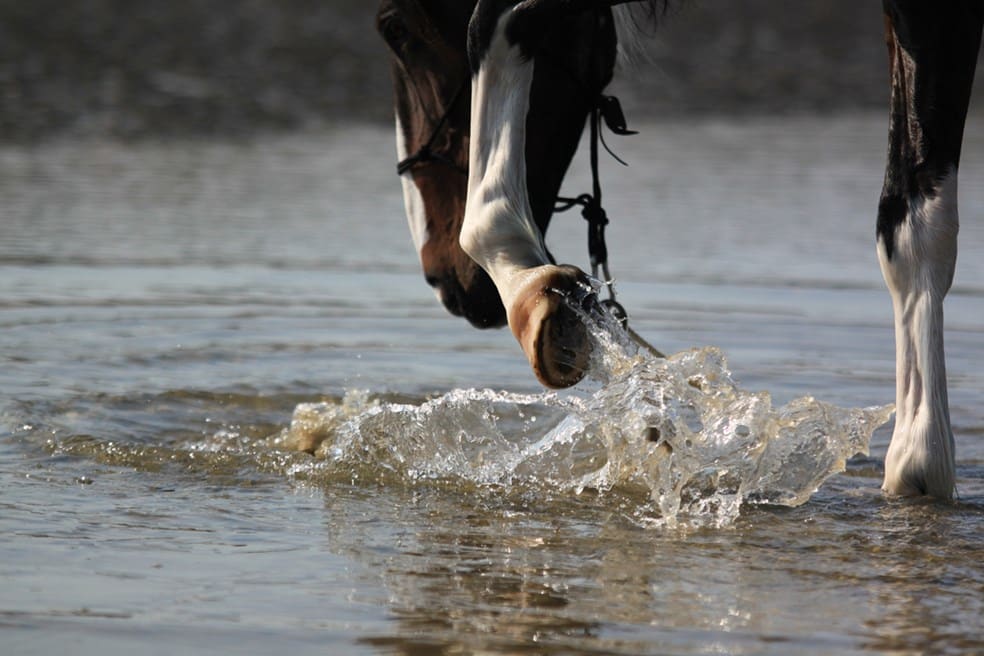
Horses Swim Speed: A Study Km/h
Now, you must be wondering what speed horses can swim. Horses are primarily terrestrial creatures that move slower in the water, reaching a top speed of only 4 km/h. This speed emphasizes water’s difficulty because it contrasts sharply with its terrestrial capabilities. Swimming takes a lot of energy; even a 10-minute swim is equivalent to several miles of cantering. Horses primarily use their huge lungs for forward propulsion when swimming, even though the same features also help with buoyancy and lower the energy required to stay afloat. Conditions like currents and the peacefulness of the water affect how long and how well one can swim. Horses that are in calm waters can exercise for longer than those that are in currents.
Moreover, every horse’s swimming endurance varies based on their unique talents and degree of fitness. Because horses’ endurance and health risks vary significantly, it is imperative to watch for indicators of exhaustion during swimming. Horses can be kept safe in watery settings by observing their limitations and overall health.
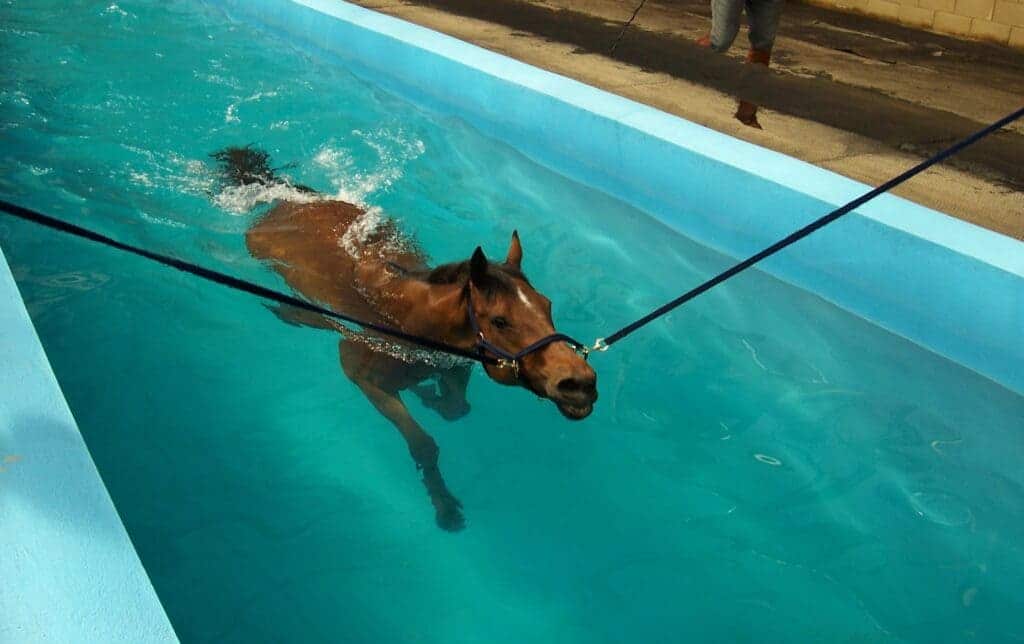
Final Thoughts: Can Horses Swim?
Moving towards the end, we have learned that horses have an instinct to swim and are surprisingly skilled in the water! This exploration shows that horses like swimming as a refreshing pastime in general. Their large lungs and naturally born capacity to stay afloat allow them to swim over deep water quickly. Swimming also aids in healing for injuries to the horse’s leg and tendon injuries. Swimming is also a fun complement to trail rides, providing unique opportunities for horse and rider connection just like horses swim in Minecraft! Horses cannot hold their breath, but they can swim faster alongside a rider, which gives equestrian sports an exciting new element. Because safety comes first, ensure your horse is secure in water; water does not enter the horse’s ear and is comfortable when submerged.
In conclusion, respecting a horse’s skills and boundaries in the water is essential for a happy and safe experience, whether in a pool or the wild.



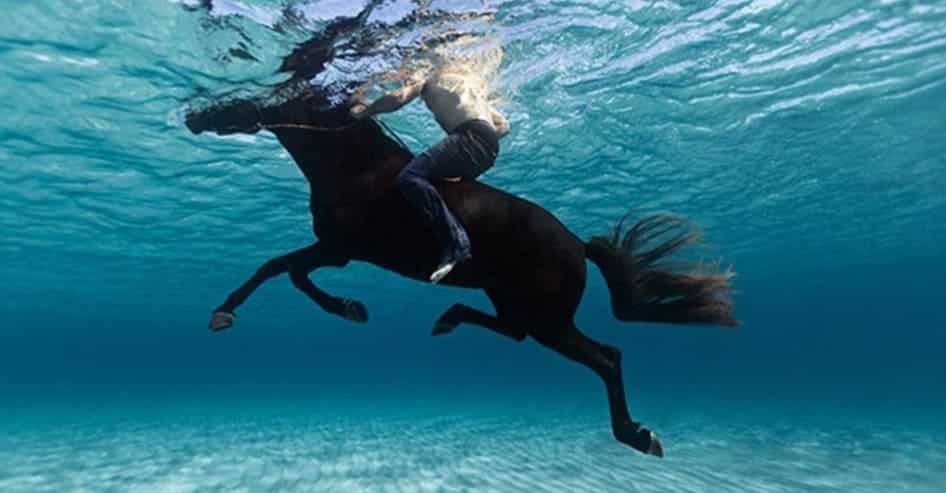
1 comment
[…] are really powerful animals. They are not just for land, but they also have the natural ability to swim in water. However, the male horse requires a gelding horse at a certain time in their life. Now, you must be […]